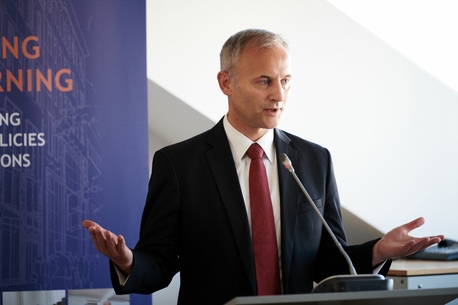Interview with Holger Flörkemeier, Departing Deputy Director of the JVI
September 13, 2021
Holger Flörkemeier was the JVI Deputy Director for the last four years. On the occasion of his departure, we interviewed him and asked him to share his experience and views on the JVI and Vienna, on challenges and achievements, and on his role in the adaptations to the new virtual teaching and learning environment.
Can you please give an overview of your role and responsibilities as Deputy Director at the JVI?
As Deputy Director, I led the economist faculty and IT department. In these areas, I was responsible for coordinating program development and analytical work, collaborating with partner organizations, managing a technical assistance project, conducting outreach, talent acquisition and management, and managing financial resources. I was also actively involved in teaching various JVI courses, which has been a very rewarding experience.
What was the biggest challenge that you had to overcome during your time here?
Unsurprisingly, the COVID-19 pandemic stands out among the challenges we have faced in the past four years. JVI training was disrupted for three months, and we had to completely change the model how JVI delivers training during the crisis. Substantial program and operational adjustments were needed for a swift resumption of training delivery in a virtual format. This included the implementation of the necessary network and VTC infrastructure; the conversion and redesign of JVI’s courses to virtual format; the adoption of new training technology solutions and innovative training methodologies; program coordination with JVI partner organizations; and country outreach to disseminate information about the new training program and modalities. Currently we are preparing for a gradual return to classroom training, which also involves developing hybrid training options that will combine face-to-face and virtual elements.
(How) has the curriculum at the JVI evolved over the four years?
JVI has become a much busier place since I arrived in 2017, and both the number and variety of training courses offered has greatly increased—and this despite the constraints due to the pandemic. JVI economists have developed several new courses in collaboration with our various partner organizations, and the number of these so-called collaborative courses grew from five in 2017 to thirteen in 2021. This includes this year’s new course offerings on Climate Change Economics and Policy Support to the Private Sector (the latter specifically dealing with public policy responses to manage the economic fallout of the pandemic); last year’s newly introduced courses on The Future of Tax and The Future of Work; and several courses in the monetary and financial stability areas (Monetary Policy Communication, Nonperforming Loans, Fintech and Financial Stability, Real Estate Analysis, Risk-focused Bank Supervision and Risk Assessment). In addition, JVI has added a very rich program of 50+ webinars since last year, including on policy responses to the pandemic, climate change economics, and other topical policy issues. In short, the JVI faculty has been extraordinarily innovative and dedicated in developing the curriculum, and the entire JVI team has done a great and joint effort in implementing this ambitious program.
What is the change/innovation you are most proud of?
Both the expansion of JVI’s curriculum and the successful switch to virtual training described above are great achievements of the entire JVI team. In addition, we have initiated major innovations in JVI’s digital communications over the past year. The COVID-19 pandemic not only disrupted JVI’s training delivery, but also our interaction with JVI’s constituency, resulting in substantially lower personal communication and website traffic, a drop in applications, and the need to proactively disseminate information about JVI’s new virtual training and webinar offerings. I have overseen the development of a new digital communication strategy to strengthen messaging and information dissemination about JVI training and to boost reach across JVI’s constituency. That said, what I am most proud of is that I could contribute to maintaining and developing a very strong JVI team during a time of high turnover, with about two thirds of the current JVI staff joining during the past four years.
After four years of living in Vienna, you will return to the IMF. What will you miss most?
Vienna is an exceptionally beautiful, international, and culturally rich city. I have greatly enjoyed the architecture, parks, and surroundings of Vienna, its world-class museums and theaters, and in particular its fantastic classical music scene. I have fallen in love with this city and its people, and I feel very much at home here. Working at JVI and having the opportunity to meet so many interesting course participants from more than thirty countries has been a greatly rewarding experience.
Barbara Dutzler, Senior Economist, JVI










